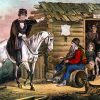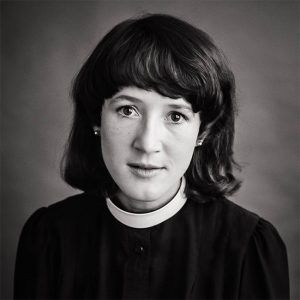calsfoundation@cals.org
Andrew Kilgore (1940–)
Andrew Wilson Kilgore is a Fayetteville (Washington County) photographer best known for his arresting black-and-white portraits, primarily of fellow Arkansans set against a plain backdrop. By his own estimation, Kilgore photographed more than 30,000 people in Arkansas between early 1971 and late 2011.
Andrew Kilgore was born on November 2, 1940, in Charlottesville, Virginia. He was the second of three children born to Bill and Carolyn Kilgore, both natives of Washington DC. Kilgore’s family moved several times when he was a child, first relocating to the Chicago, Illinois, suburb of Aurora shortly after World War II and then to El Paso, Texas, in 1956. Kilgore cites his time as a teenager along the Texas border as the period of his life that opened his eyes to human diversity; this awareness would later become evident in his choice of subject matter for his portraits.
With plans to become a Presbyterian minister, Kilgore earned a philosophy degree from Earlham College in Richmond, Indiana, in 1963. While attending Union Theological Seminary in New York City, he studied acting under Stella Adler. It was this experience that Kilgore has said led him to conclude that he “wasn’t cut out for the ministry,” and that he’d rather try his luck on the stage.
With the escalation of the Vietnam War under way, Kilgore told the draft board in 1966 that he planned to return to graduate school to study acting and theater. Eventually, his draft classification was changed to 1-A, at which point Kilgore joined the Peace Corps, where he served two years in India. During his return to the United States following his stint in the Peace Corps, Kilgore bought his first camera in Hong Kong in 1970. He was en route to Austin, Texas, where he had accepted a job working with the developmentally disabled at the Austin State School. Kilgore regularly took his camera to work and photographed the students, developing the photographs at the home of a neighbor who had built a darkroom.
Following his stay in Austin, Kilgore decided to go to San Francisco, California, by way of Fayetteville, where he planned to visit friends. What was intended to be a brief visit turned into a longer stay. He said, “I came here by accident but after I was here for about six months I sat down and made a very deliberate choice to stay here and spend my life and career here. I knew it might not have the rewards of a broader reputation as a photographer but that it would give me a great deal of freedom and a population of people that I had really come to love and respect.”
With only a degree in philosophy and his informal training in photography, the University of Arkansas (UA) hired Kilgore as a photography instructor, and he taught there from 1973 to 1977. During this period, the work of eccentric Heber Springs (Cleburne County) portrait photographer Michael Disfarmer surfaced, and Kilgore came across it during an exhibition in Fayetteville. Kilgore cites Disfarmer, along with professional photography luminaries such as Richard Avedon and Irving Penn, as the biggest influences on his own style.
Kilgore was married to Meg Kilgore for fifteen years, during which time he helped raise two step-children. Their marriage ended in divorce in 1988.
Kilgore’s professional approach is to use his easy-going and welcoming personality to put subjects at ease through conversation about themselves so as to get a natural reaction that translates to the images. He has referred to this as a type of “alchemy” in which a subject is in an enclosed space, against a backdrop, and only loosely posed in a “natural kind of way,” after which he interacts with them “in ways that will help them to present themselves as naturally as possible.”
Kilgore’s exhibitions include: The Fayetteville Townfolk Portfolio Project, which toured the state; We Drew a Circle, consisting of eighty images of the developmentally disabled, funded by Stephens, Inc. and the National Endowment for the Humanities and exhibited around the nation; Keeping In Touch, which was a project for the Arkansas AIDS Foundation; Arkansas People, a project for the Arkansas Sesquicentennial in 1986, spawning a book of the same name; Healing Changes, a series of images of the mentally ill; and Community Meals (A Reluctance to Engage), a series of photographs of the homeless/jobless in which Kilgore exchanges a $20 bill for the right to take a subject’s photograph.
In September 2014, the documentary A Lens to the Soul: The Photography of Andrew Kilgore premiered at the Fayetteville Public Library. In February 2016, the library displayed a portion of Kilgore’s long-term project Let There Be Light: 100 Black Men that featured twenty Black students from Fayetteville High School.
For additional information:
Andrew Kilgore. http://www.andrewkilgore.com/ (accessed January 23, 2024).
Isham, Kara. “Andrew Wilson Kilgore.” Arkansas Democrat-Gazette, June 19, 2005, pp. 1E, 4E.
Kilgore, Andrew, and Meg Kilgore. Arkansas People—Looking Forward. Fayetteville, AR: First United Methodist Church, 1987.
“Q&A with Portrait Photographer Andrew Kilgore.” Walton Arts Center. https://www.blog-waltonartscenter.org/wacblog/100photographsandrewkilgore (accessed January 23, 2024).
Keith Merckx
“Arkansongs”
 Arts, Culture, and Entertainment
Arts, Culture, and Entertainment Divergent Prosperity and the Arc of Reform, 1968–2022
Divergent Prosperity and the Arc of Reform, 1968–2022 Peggy Sue Bosmyer
Peggy Sue Bosmyer  Delani
Delani  John Thomas
John Thomas  Andrew Kilgore
Andrew Kilgore  Raymond
Raymond 



Comments
No comments on this entry yet.